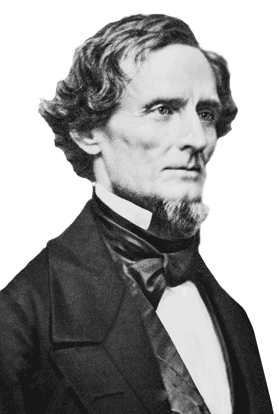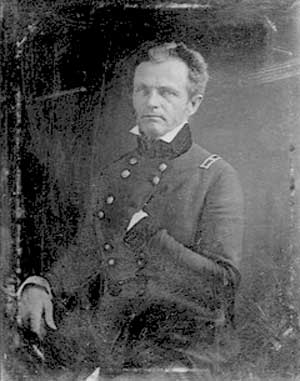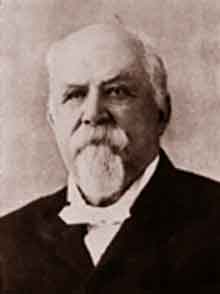"Raymond Years Ago"
By George W. Harper
Journalist - Editor - Owner Of Hinds County Gazette 1845-1883
A Series Published in the Hinds County Gazette, 1878-1879
From the Gillespie Collections edited by Pattie Adams Snowball and Rebecca Blackwell Drake
Home Page
Harper Arrives in Mississippi
Vicksburg & Meridian RR
Businesses in 1844
The Raymond Bar
Early Merchants
1844 Businesses
Seat of Justice
Cotton Industry
Early Churches
Establishment of Schools
John B. Peyton
Raymond Area Homes
Medicinal Resorts & Spas
The Mexican War
Early Churches
Early Schools
Raymond Female Institute
Raymond Military Institute
McNutt-Foote Debate
1844 Presidential Election
Local Elections of 1845
Literary Raymond
Raymond Fires
Old Log Jail
Death of Jos. Stewart
Murder of Benj. Sims
Duel Ends in Death
Raymond & Bolton RR
Harper Elected Mayor
Chaos at Oak Tree Hotel
Great Fire of 1858
Early Area Settlements
-
Amsterdam
-
Yeizer's Store
-
Newtown
-
Meridian Springs
-
Sturgiss Store
-
Dry Grove
-
County Line
Rev. Fisk's Biology Class
Fisk Charged with Fraud
Fleetwood Tragedy
Local Racetracks
Dignitaries Visit Raymond
Winning the Lottery
Fire Company No. 1
"Devoted & Valued Friend"
Tribute to Amos Johnson
Yellow Fever Strikes Raymond
Doctors Treating Victims
Cooper's Well
Mississippi Springs
Newspaper Entrepreneurs
Yankees Sack Gazette Office
Fate of Editorial Giants
Henry Clay Defeated in 1844
Stray Cats in Raymond
"A Remarkable Occurrence"
Blow That Punky Bell to Hell"
Isom Bldgs Destroyed
1851 Gubernatorial Election
Union Ticket Sweeps State
New Raymond Courthouse
Gibbs Building Rebuilt
Hinds Co. Poor House
Schools Struggle
Murder of Addie Owens
War comes to Raymond
The Battle of Raymond
Willie Foote Captured
Make-shift Hospitals
Yankees Occupy Raymond
Raymond Lodge No. 21
Odd-Fellows' Graveyard
Bolls Incarceration
Crimes Blamed on Whisky
Peyton's Willow Tree Prank
Politics in Raymond
Presidential Election 1860
Hinds Co. for Succession
Raymond Fencibles Organized
Churches Reorganize
The Clinton Riot of 1875
Why the Great Uneasiness?
Deaths of Sivley & Thomson
"Kill the Raymond Men"
Harrison Election
Political Gatherings
Event at Dupree's Grove
Presidential Election 1876
Governor Ames Impeached
Great Wrongs Investigated
Fight the Devil with Fire
Reconstruction Era
Harper Ends with Poetic Vision
Part XV
1851 Gubernatorial Election
Southern Rights Democrats Oppose Union Party
The election of 1851 was by all odds the most spirited and bitter political contest (save that of 1875) that has occurred in Mississippi since 1844. It commenced in Hinds county very early, in 1850 in fact, and the first meeting in Hinds county in opposition to the tide which gave the party a start, was held in the old court house in Raymond. The hand-bill calling that meeting was headed, “Liberty and Union, now and forever,” and was signed by Amos. R. Johnston, John B. Peyton, John Shelton, Geo. W. Harper, S. T. King, and perhaps a half dozen others. But the fight was really inaugurated in the United States Senate, in 1850, when Mississippi’s Senators, Jefferson Davis and H. S. Foote, took opposite grounds on the Compromise measures of that year and appealed to the people of the State for their verdict. The Hinds County Gazette sustained Senator Foote.
|
Jefferson Davis adherents claimed to be State-Rights Democrats, and the peculiar friends of Southern honor and Southern Rights, and charged that their opponents were “cowardly submissionists,” and prepared to surrender to the North every demand that it might make upon the South, even to the abolition of African slavery. Foote’s adherents claimed to be better friends of the true interests of the South than Mr. Davis’ adherents. That Davis and his party were Secessionists and Disunionists, and were in favor per se of the erection of a Southern Confederacy and the destruction of the Union of the Fathers.
The celebrated Nashville Convention had been held, and adjourned to meet again. Its spirit had encouraged the Secessionists. Gen. Quitman was Governor, and adhered strongly to the position of Mr. Davis, as did nearly all the leading Democrats in the State.
On the admission of California, Gov. Quitman called the Legislature together in extraordinary session, to consider and adopt measures for Southern safety. That legislature, (strongly Democratic,) after censuring Foote and applauding Davis, called a Convention to consist of delegates elected by the people to consider of the mode and manner of redress. All this was towards the close of 1850 and the commencement of 1851, and the people immediately divided off and commenced a furious contest – truly wonderful for personal bitterness. The Davis handbills were generally headed “Southern Rights,” while the Foote posters called upon the people to “Rally for the Union.”
 Very early in March the Union men, as Foote’s friends
called themselves, met in the courthouse in Raymond and nominated their ticket,
taking the lead in the State. The ticket was constituted as follows: “For the
convention – H. S. Foote, Wm. L. Sharkey, Amos R. Johnston. For the State Senate
– D. W. Adams. For the Legislature – T. J. Catchings, Geo. W. Harper, I. N.
Selser.” And soon afterwards the same party held their State Convention,
nominating Foote for Governor, Freeman for Congress in this district, &c. The
nomination of Foote for Governor (which was done against his protestations)
necessitated the withdrawal of his name from the county convention ticket, and
Dr. Geo. Banks’ name was substituted. All candidates in the county were that
summer “called out” as to their sentiments on the great questions, and from
constable up no man was tolerated as a candidate for office by the Union men who
was not decidedly and unequivocally on the Union platform. The Southern Rights
Democrats were quite as restrictive and violent as the Union men. They nominated
Quitman for Governor, McWillie for Congress in this district, and the following
county ticket: “For the Convention - D. C. Glenn, C. E. Hooker, Wm. Smith. For
the Senate - J. W. L. Smith. For the Legislature - M. W. Phillips, A. B. Brown,
W. Rossman.”
Very early in March the Union men, as Foote’s friends
called themselves, met in the courthouse in Raymond and nominated their ticket,
taking the lead in the State. The ticket was constituted as follows: “For the
convention – H. S. Foote, Wm. L. Sharkey, Amos R. Johnston. For the State Senate
– D. W. Adams. For the Legislature – T. J. Catchings, Geo. W. Harper, I. N.
Selser.” And soon afterwards the same party held their State Convention,
nominating Foote for Governor, Freeman for Congress in this district, &c. The
nomination of Foote for Governor (which was done against his protestations)
necessitated the withdrawal of his name from the county convention ticket, and
Dr. Geo. Banks’ name was substituted. All candidates in the county were that
summer “called out” as to their sentiments on the great questions, and from
constable up no man was tolerated as a candidate for office by the Union men who
was not decidedly and unequivocally on the Union platform. The Southern Rights
Democrats were quite as restrictive and violent as the Union men. They nominated
Quitman for Governor, McWillie for Congress in this district, and the following
county ticket: “For the Convention - D. C. Glenn, C. E. Hooker, Wm. Smith. For
the Senate - J. W. L. Smith. For the Legislature - M. W. Phillips, A. B. Brown,
W. Rossman.”
|
The canvass in Hinds was managed with superior ability by both parties, and commenting so early there was time for most comprehensive and ample work. There were barbeques and free discussions in every part of the county. Gov. Quitman, Gen. Foote, Col. Davis, Judge Sharkey, Gen. Freeman, Fulton Anderson, Col. Tarpley, and all the county candidates, of both parties, were on the stump from March until November. While Foote and Quitman were filling an appointment in Panola county, in midsummer, they had a personal encounter, in which blows passed right heartily. Soon afterwards Gen. Quitman (not on account of the fisticuff, however,) withdrew from the contest, and Col. Davis became the regular candidate for Governor against Foote - and here was the appeal to the people, the two U. S. Senators running for Governor, and each on the identical platform he had placed himself upon in the United States Senate. The contest attracted great attention throughout the Union, and no county was looked to with greater interest than Hinds, as it was one of the largest slave holding, wealthiest and most intelligent counties of the State - having the State capital, and likewise the home of the most of the lions in the contest.
Union Ticket Sweeps the State
|
The Convention election came off first - in October, we believe - while the State election took place in November. The Union men carried Hinds in the convention election by 500 majority, in a vote of 1800, and the State by 10,000 in a vote of 1800, and the State election, a month after, the entire Union ticket was elected in Hinds by from 400 to 500 majority, and the Union ticket swept the State.
The Convention was overwhelmingly Union, and met at the appointed time, but did little beyond advising the North to adhere to the Constitution and laws, respect the rights of the South, and study Washington’s Farewell address.
The Legislature, too, was largely Union, but the Senate being Southern-Rights, (owing to the number who held over,) prevented the Union men from doing all that they had promised the people to do.
All photographs and illustrations were edited into the series by Pattie Snowball and Rebecca Drake.
Copyright © 2008 PattieAdams Snowball, James and Rebecca Drake


